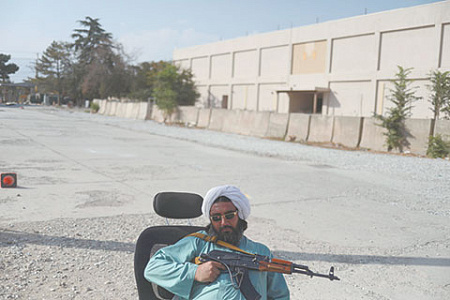
In a surprising diplomatic move, former U.S. President Donald Trump has demanded that Afghanistan’s Taliban government return control of the Bagram Air Base, a sprawling and strategic complex near Kabul. The ultimatum was met with a swift and firm rejection from the Taliban, who advised the United States to adopt a policy of “realism and rationality,” making it clear that the return of the base, a potent symbol of their 2021 victory, is not on the table.
The Taliban-led government in Kabul was quick to reference the Doha Agreement, the very pact that paved the way for the U.S. military withdrawal. They reminded Washington of its commitment under the agreement to refrain from the threat or use of force against Afghanistan’s territorial integrity and to not interfere in its internal affairs. The statement underscored a demand for the U.S. to “remain faithful to its obligations,” setting the stage for a new phase of tense relations.
Trump’s rationale for the demand is multi-faceted, weaving together domestic politics and global strategy. He has repeatedly criticized President Joe Biden’s handling of the chaotic 2021 withdrawal and has framed the repossession of Bagram as a necessity to counter China’s growing influence. In a particularly striking comment, Trump noted the base is merely “one hour away from where China makes its nuclear weapons,” adding a dramatic geopolitical layer to his gambit. While refusing to specify if military action was an option, he cryptically suggested that the U.S. is in contact with Afghan authorities and that they “want certain things from us.”
For the Taliban, Bagram Air Base is more than just strategic real estate; it is a symbol of their triumph. The facility, which housed a notorious detention center where many Afghans were held without trial during the war, was abandoned by U.S. and Afghan government forces and fell to the Taliban without a fight. Its recapture was a pinnacle moment in their return to power, and relinquishing it would be seen as a major concession and a symbolic defeat.
This standoff highlights a complex international dynamic. Despite a near-universal lack of formal diplomatic recognition, nations are increasingly engaging with the Taliban as the de facto rulers of Afghanistan out of practical necessity. “The Taliban is being treated as the ruler of Afghanistan, even though it has not been formally recognized by most states,” noted Aizaz Chaudhry, a former foreign minister of Pakistan. This pragmatic engagement is driven by a range of self-interests.
The European Union, grappling with a rise in anti-immigrant sentiment, sees cooperation with the Taliban as essential for any potential deportation of undocumented Afghan migrants. For the United States and other powers, a common enemy in the form of radical jihadist groups like ISIS-K provides a narrow basis for communication. Meanwhile, Afghanistan’s neighbors are cautiously pursuing trade and transit opportunities, viewing stability as paramount.
However, the path to international normalization is fraught with obstacles. Michael Kugelman, a senior fellow at the Asia Pacific Foundation of Canada, calls these emerging ties a “major strategic victory for the Taliban,” but notes the regime is struggling to break its isolation. Hardliners within the movement continue to enforce draconian policies, particularly the severe restrictions on the rights of women and girls, which remain a primary barrier to broader engagement with Western nations. Sanctions also remain in place, hindering the regime’s ability to function on the world stage. Ultimately, Trump’s demand, described by one Russian academic as absurd as “asking Vietnam for a base back after losing the war,” underscores the surreal and volatile state of post-war relations between Washington and Kabul.
